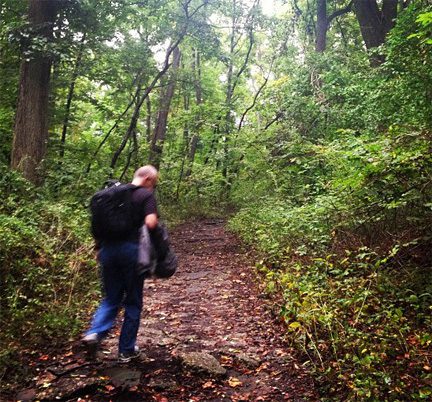Yesterday, I considered the interweaving of digital life and embodied life in response to an article that explained how political spats on Facebook impact relationships, including the face-to-face kind. Today, I want to look at another curious case of such interweaving of the digital and the embodied.
In “Seeking Privacy in a Networked Age,” New York Times columnist Nick Bilton chronicles the loss of privacy owing to the combination of social media and mobile technology.
A pulled pork taco hovered about four inches from my mouth when my phone impolitely interrupted me. “Hey, I see you’re having people over. O.K. if I stop by?” read a text message from someone whom I had not invited to my dinner party.
How did the person know I was even having a party? I needed only to glance at my guests, who were sharing messages and photos of the dinner to their online social networks.
Call it the latest episode of “Nothing’s Private Anymore.”

Even if you refuse to join Facebook, even if you never take pictures with your iPhone or Galaxy, chances are your face has shown up on Facebook or some other social media platform. I expect this is even truer for people under 30 than it is for folks in my generation on up. But don’t think you’re safe from having your privacy invaded. Bilton quotes Dennis Crowley, the chief executive of Foursquare, who says, “I don’t think it’s the norm for most people yet; it is though for the microcosms that are Silicon Valley or South by Southwest. . . . But, at the same time, I think those things predict the future and the way the tech elite act now is the way everyone will experience the world a few years from now.”
Bilton speculates about the development of an cloaking service that would allow you to keep your name or image from being displayed on Facebook and similar platforms. But he does not open up a conversation that I think is due, if not overdue. I’m thinking about a serious conversation of how we use social media in embodied social gatherings. In years past, if I were at a dinner party at your home, I would not take a photo of you, print multiple copies, and then send it to all of my friends without first asking your permission. Why, then, would I think it’s okay to do this digitally? Is there some unwritten rule that says the person with the the mobile device has the right to post pictures of others without asking, or to comment on private parties?
Or, is it time for us to think about how we ought to use our digital devices in embodied social settings? Perhaps it should be understood that we don’t post photos of others without asking. Perhaps we should all agree that we won’t describe what’s happening at a private party unless everyone involved is okay with that. Perhaps, just perhaps, we might consider whether we should check our mobile devices at the door so that we might be fully present to each other for a short while. Hmmmm.
I don’t expect there’s a one-size-fits-all answer to these sorts of questions. But I do believe we need to do some serious thinking about the interweaving of our digital and embodied lives, so that we might form new norms for relationship that are respectful both of people and of our privacy.












